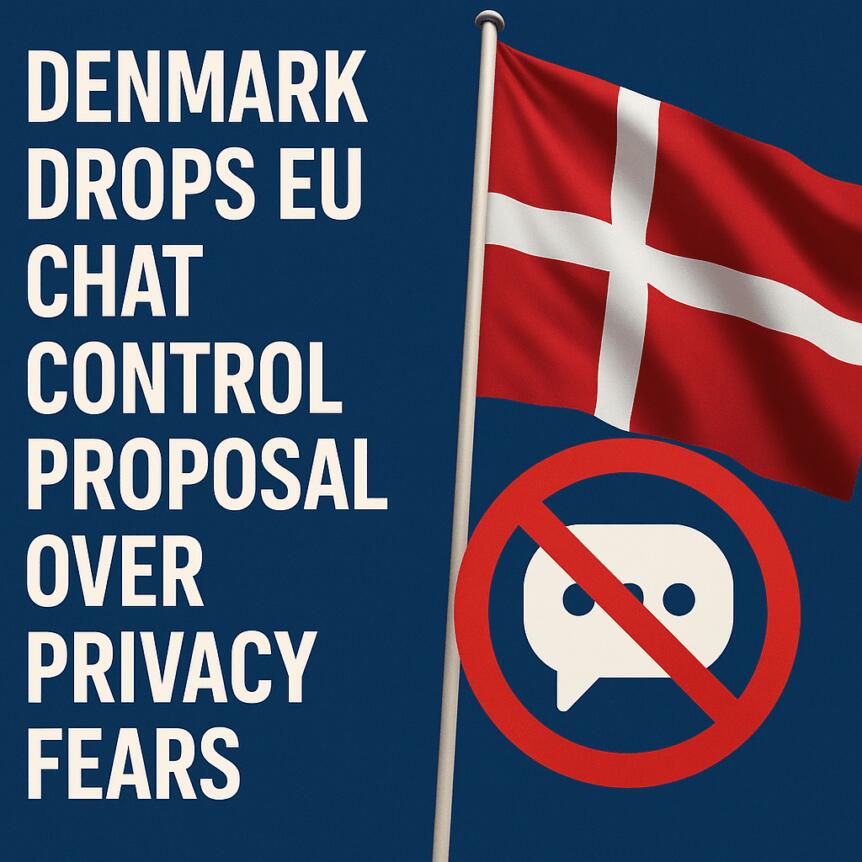Denmark Drops EU Chat Control Proposal Over Privacy Fears

In a significant development for digital privacy advocates, Denmark has refrained from pushing forward a controversial EU legislative proposal that would have required messaging platforms like Telegram, WhatsApp, and Signal to enable authorities to scan encrypted messages. The move reflects ongoing tensions between efforts to combat illegal content and the right to privacy in the rapidly evolving landscape of cryptocurrency and blockchain communications.
- Denmark withdraws its proposal requiring message scanning on encrypted platforms, maintaining voluntary cooperation.
- The legislation, known as the Chat Control law, aimed to combat illegal content but faced strong opposition over privacy concerns.
- EU discussions on messaging surveillance face political stalemate, with delays expected until Ireland takes over presidency in 2026.
- Tech companies and civil freedoms advocates praise Denmark’s decision, emphasizing the importance of encryption and user privacy.
Denmark, currently holding the European Council presidency, has announced it will not pursue the proposed legislation that would have mandated platforms such as Telegram, WhatsApp, and Signal to allow authorities to scrutinize messages before they are encrypted and transmitted. The legislation, dubbed the Chat Control law, was originally introduced in May 2022 as part of broader efforts to curb illicit content circulating on messaging services.
The initiative was revived this year, sparking widespread criticism for potentially undermining privacy rights and the security of encrypted communications. Critics argued that the law could lead to mass surveillance and violate fundamental human rights, fueling concerns from privacy advocates and technology firms alike. The withdrawal means that platforms like WhatsApp and Signal will continue to operate on a voluntary basis, with no legal obligation to implement message scanning tools.
Current Legal Framework and Future Outlook
Denmark’s Justice Minister, Peter Hummelgaard, clarified that the legislation will no longer be part of the EU’s compromise proposals. Instead, efforts will focus on maintaining the existing voluntary framework, which expires in April 2026. Hummelgaard indicated that prolonged political deadlock over chat surveillance could leave the EU without effective tools to tackle malicious activities on messaging platforms if the issue remains unresolved.
To avoid such a scenario, Denmark has paused legislative efforts, aiming to establish a new framework before the current program sunsets. This postponement underscores the ongoing debate within the EU about balancing security needs with protecting citizens’ privacy and secure communication channels.
Support from Privacy and Tech Advocates
Source: X Global Government AffairsSupporters from the tech sector and civil liberties organizations celebrate the decision, viewing it as a victory for privacy rights. X’s Global Government Affairs team described Denmark’s withdrawal as “a major defeat for mass surveillance advocates,” reaffirming their commitment to oppose any government initiatives that undermine encryption or aim to enhance intrusive message scanning.
Patrick Hansen, EU Strategy Director at Circle, also commended the move, calling it a “major win for digital freedoms in Europe.” The Electronic Frontier Foundation (EFF), a prominent civil liberties advocate, echoed these sentiments, asserting that public pressure was instrumental in stopping the legislation’s advancement.
Call for Lawmakers to Respect Encryption
Thorin Klosowski, an EFF security activist, emphasized the importance of respecting encryption technology, warning lawmakers against attempting to bypass it under the guise of safety. In a blog post, he urged legislators to develop “real solutions that do not violate human rights,” criticizing efforts to deploy message scanning that erode privacy globally.
He added that “this sort of surveillance is not just an overreach; it’s an attack on fundamental human rights.” The upcoming EU presidency of Ireland, starting in July 2026, will likely face continued pressure to address these issues, but advocates remain hopeful that the focus will shift toward protecting user privacy and secure messaging.
As debates over crypto regulation and secure communications intensify across Europe, Denmark’s decision marks an important reminder of the ongoing struggle to balance security with privacy in the age of blockchain and digital innovation.
This article was originally published as Denmark Drops EU Chat Control Proposal Over Privacy Fears on Crypto Breaking News – your trusted source for crypto news, Bitcoin news, and blockchain updates.
You May Also Like

A New Aid Blueprint? Meta Earth Tests On-Chain Consensus, Off-Chain Action in the Philippines

Fed Rate Cuts May Push Crypto Prices Up As ‘Digital Gold’ Replaces TradFi
